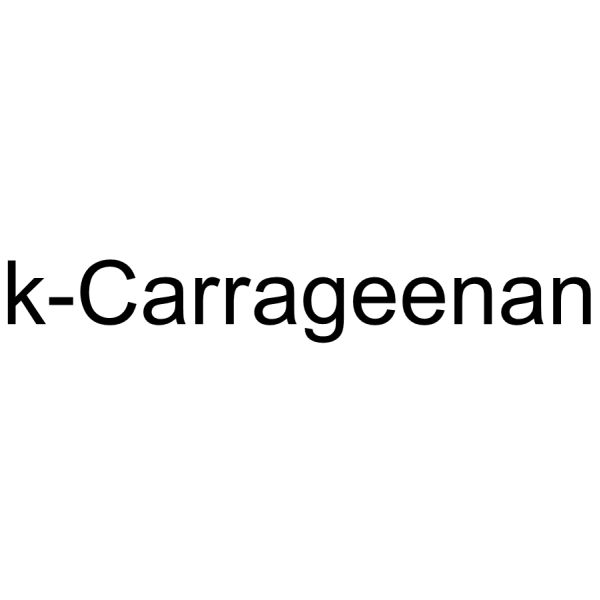Shopping Cart
- Remove All
 Your shopping cart is currently empty
Your shopping cart is currently empty
κ-Carrageenan is a natural polymer predominantly found in red seaweeds that can serve as an effective carrier to deliver curcumin to cancer cells and induce apoptosis. It can also be used to induce paw swelling models and acts as a potential inflammatory agent that amplifies existing intestinal inflammation.

| Pack Size | Price | Availability | Quantity |
|---|---|---|---|
| 50 mg | Inquiry | Backorder | |
| 100 mg | Inquiry | Backorder |
| Description | κ-Carrageenan is a natural polymer predominantly found in red seaweeds that can serve as an effective carrier to deliver curcumin to cancer cells and induce apoptosis. It can also be used to induce paw swelling models and acts as a potential inflammatory agent that amplifies existing intestinal inflammation. |
| In vitro | κ-Car-Curcumin (Cur) (0-500 μg/mL; 24-72 hours) effectively inhibits the growth of cancer cells at concentrations as low as 40 μg/mL[1]. The Cur-loaded κ-Car displays significant cytotoxicity, with high apoptotic activity observed in A549 lung cancer cells[1]. In addition, κ-Carrageenan (1-60 μg/mL; 0.5-24 hours) is shown to amplify LPS-induced IL-8 secretion in HT-29 cells[2]. A Cell Viability Assay on the A549 cell line with Cur concentrations ranging from 0-500 μg/mL over 24, 48, and 72 hours demonstrates dose-responsive effects, yielding significant IC 50 values of 65, 50, and 40 μg/mL for 24, 48, and 72 hours, respectively[1]. |
| In vivo | κ-Carrageenan, administered orally at dosages ranging from 1.7 to 41.7 mg/kg for 1 week prior to Citrobacter freundii DBS100 treatment, markedly enhances LPS-induced inflammation via the Bcl10-NF-κB pathway. This action is evident from the exacerbation of C. freundii DBS100-induced colitis in mice, particularly through the increased induction of TLR4 and NF-κB in the intestinal mucosa of the affected animals. Moreover, κ-Carrageenan intensifies TNBS-induced intestinal inflammation, a process possibly linked to oxidative stress alongside the activation of both the TLR4-NF-κB and MAPK/ERK1/2 pathways. This observation was made in studies utilizing both male and female NIH (s) mice, with the compound being orally administered in low, medium, and high doses, specifically 1.7 mg/kg, 8.3 mg/kg, and 41.7 mg/kg, respectively. The results indicate a heightened induction of TLR4 and NF-κB pathways in the intestinal mucosa of mice infected with C. freundii DBS100. |
| Cas No. | 11114-20-8 |
| Storage | Powder: -20°C for 3 years | In solvent: -80°C for 1 year | Shipping with blue ice. |

Copyright © 2015-2025 TargetMol Chemicals Inc. All Rights Reserved.